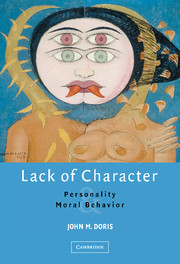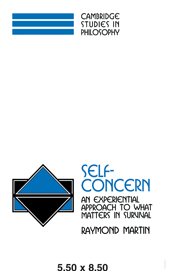
Lack of Character
Personality and Moral Behavior
- Author: John M. Doris, University of California, Santa Cruz
- Date Published: August 2002
- availability: Available
- format: Hardback
- isbn: 9780521631167
Hardback
Other available formats:
Paperback, eBook
Looking for an inspection copy?
This title is not currently available on inspection.
-
This book is a provocative contribution to contemporary ethical theory challenging foundational conceptions of character that date back to Aristotle. John Doris draws on behavioral science, especially social psychology, to argue that we misattribute the causes of behavior to personality traits and other fixed aspects of character rather than to the situational context. More often than not it is the situation not the nature of the personality that really counts. The author elaborates the philosophical consequences of this research for a whole array of ethical theories and shows that, once rid of the misleading conception of motivation, moral psychology can support more robust ethical theories and more humane ethical practices.
Read more- Challenges foundational conception of 'stable moral character' that has shaped all moral psychology and ethical theory
- Potential cross-disciplinary interest
Reviews & endorsements
'Doris is exploring, and taking the lead in creating, a field of 'empirically informed ethics'. He has paid close, careful, imaginative attention to psychological studies that turn out to have relevance to questions of the determinants of moral behavior, and has extracted the implications of those studies for the theories that he has also mastered, philosophical accounts of moral character, reasoning, and the production of moral actions. This is a book that will provide impetus to the formerly flagging conversation between those concerned with what is and what ought to be in the domain of morality.' John M. Darley, Princeton University
See more reviews'Lack of Character is a very important book both for psychologists and philosophers. It presents the best summary available of the psychological literature documenting the typically weak effects of personality on moral behavior and the massive effects that situations can have. The book also presents a powerful case against 'virtue ethics', which assumes that people act morally to the degree that they have certain dispositions.' Richard E. Nisbett, University of Michigan, Ann Arbor
'Lack of Character is engagingly and accessibly written, provocative, non-dogmatic, chock full of interesting arguments. It is a terrific and important contribution to moral theory and moral psychology.' Lawrence Blum, Notre Dame Philosophical Reviews
'… Lack of Character is by far the best thing I know of written on the implications of recent social psychology for philosophical discussions of virtue and character. The book refers to and assesses an extraordinary large literature in psychology, philosophy, and beyond, and works out in considerable detail one very plausible way of thinking of ethics in the light of the facts of psychology.' Gilbert Harman, Princeton University
'Doris is a punchy, spirited and bold writer who tackles the important issue of whether we are justified in our belief that there is something called stable moral character that leads to predictable behavior … His arguments do moral psychology proponents an important service by indicating how to integrate moral philosophy with current empirical research … His work should cause quite a stir within virtue ethics circles. At the very least, it should lead to a reexamination of time-worn views about character traits and their manifestations in coherent patterns of actions.' Nancy Sherman, Georgetown University, author of Making a Necessity of Virtue
'Of course, this work does not constitute a 'how-to' ethical rulebook, but it has an appealing and distressing message to those in the field of ethical practice … It is the author's intention to shed light on the situational factors influencing moral behaviour … I feel that this is an excellent book, although it seems to be missing two interesting viewpoints … the book gives an excellent overview of experimental social psychology in the domain of moral behaviour. It indeed demonstrates the poweful influence situational differences have upon moral behaviour … it is interesting for social psychologists because it summarises a field of research with great relevance outside the strict scientific commune and, hence, legitimises the discipline to a considerable extent … the book seems extremely interesting for ethicists and others studying moral behaviour, as well as people confronted with ethical dilemmas in their daily practices.' Ethical Perspectives
Customer reviews
Not yet reviewed
Be the first to review
Review was not posted due to profanity
×Product details
- Date Published: August 2002
- format: Hardback
- isbn: 9780521631167
- length: 286 pages
- dimensions: 229 x 152 x 21 mm
- weight: 0.59kg
- contains: 4 b/w illus.
- availability: Available
Table of Contents
Preface: a renaissance of virtue
1. Joining the hunt
2. Character and consistency
3. Moral character, moral behavior
4. The fragmentation of character
5. Judging character
6. From psychology to ethics
7. Situation and responsibility
8. Is there anything to be ashamed of?
Sorry, this resource is locked
Please register or sign in to request access. If you are having problems accessing these resources please email [email protected]
Register Sign in» Proceed
You are now leaving the Cambridge University Press website. Your eBook purchase and download will be completed by our partner www.ebooks.com. Please see the permission section of the www.ebooks.com catalogue page for details of the print & copy limits on our eBooks.
Continue ×Are you sure you want to delete your account?
This cannot be undone.
Thank you for your feedback which will help us improve our service.
If you requested a response, we will make sure to get back to you shortly.
×










